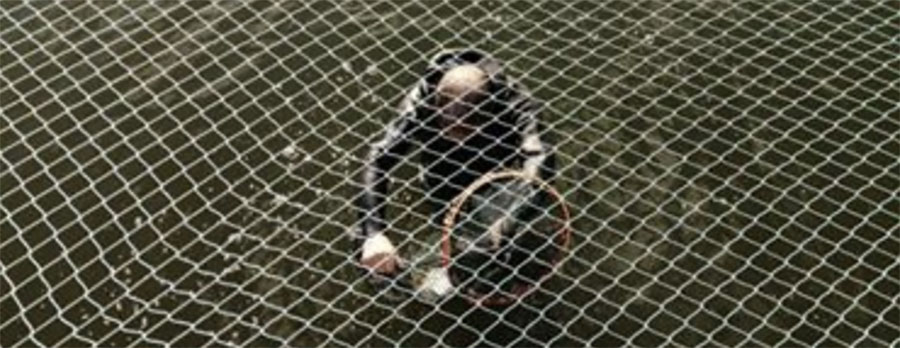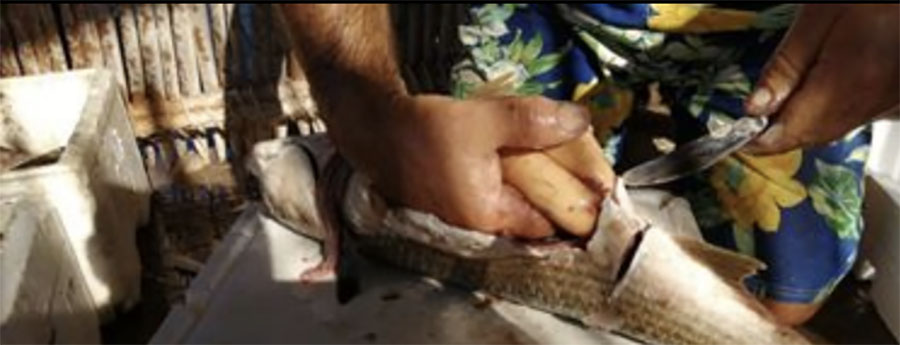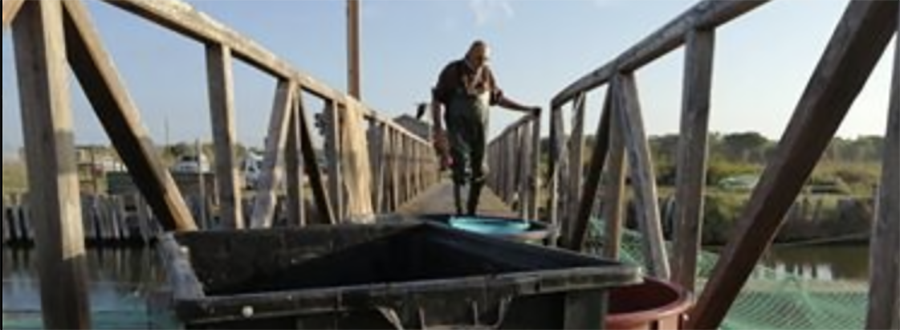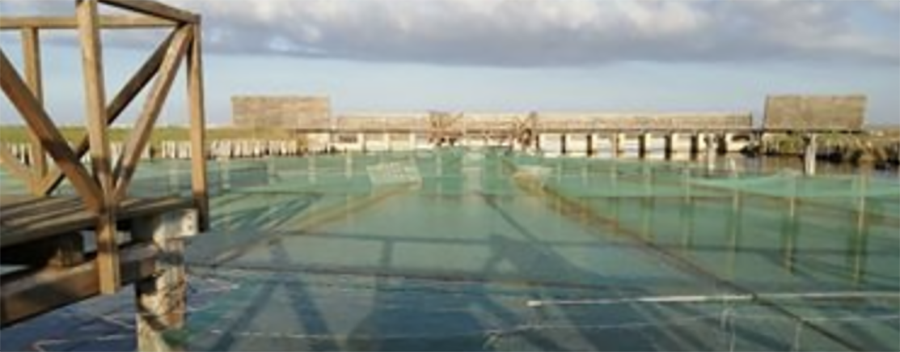"Thirty years ago the pond was like a forest. The pine forest as a frame, and all the possible plants here, in the middle. Especially cattail. It was very high, we had created passages to move from one place to another of the fishpond. And the fauna then. Not only the fish, sea and pond were very rich. Before the drought changed everything, we fished twenty-pound carps. We fished all year, not just between May and December, as we do now. An osprey has been watching us working for years, resting on that pole over there. Then it disappeared. How much satisfaction this job gave me. I'm a nature fanatic. We only had a tent held up by a pole. We slept here all night. We watched over poaching. It was much more difficult to surprise them. This place really was a forest. We got up early to go out to sea or to fish in the fishpond, back in those days it was made of reeds. How many difficulties, though. I remember the flood of 2013. Those three days wiped out everything".
Giuseppe Vacca has been president of the Sant'Andrea cooperative for fourteen years, until 2011. Over the years, the cooperative founded by people from Terralba has been progressively taken over by Marrubiu's men, the same ones who, still strong in their aged bodies, divvy up in front of the sedge house the fish by species and weight. Much has changed since the days when the vegetation grew wild. The fever of the climate and the market have also touched S'Ena Arrubia, “the bend that turns red” at sunset. As if the ancient rite of fishing no longer knew how to respond to new modern gods. This is why “we wanted these guys. They went to high school or university. I blame myself, too. We must quit with the old mentality", says Giuseppe.
"They insisted so much that after three months I eventually agreed" continues the story Alberto Porcu, 36, the new cooperative’s president. "I started in March, I had never been a fisherman. I was working and still I am working in a supermarket. My brother Alessandro is a computer engineer, and he’s the administrative manager. They helped us understand the job very quickly, and we still have to learn a lot. Unfortunately, the beginning could not have been more complicated. After a few days we immediately had to face a real crisis”.
The first blight took place in late June, and led to the loss of all the bass and sea bream juveniles. The second followed just a week later. The final strike arrived in mid-July, with the almost total annihilation of the fish fauna. "The Forest Guard intervened, as did the ARPAS (Regional Agency for the Protection of the Environment) and the AGRIS (Regional Agency for Research in Agriculture) technicians. People of the IMC (International Marine Center) did all the analysis. In the tip of the marina the oxygen was recorded at 0.2. Almost absent. Imagine in the pond. We have lost everything" explains Alberto. “There are several causes twined together. The water coming from the Sassu pump is not decanted, because of a broken pipe in the Sant’Anna area, that now thanks to the intervention of the Reclamation Consortium will be fixed. The conditions in the pond have changed so radically that today we struggle to find the few grams of clams that serve the ASL for the analyzes that guarantee the qualification of the waters. Years ago boys sometimes managed to make income only with clams. But then not all these algae existed. With decomposition they burn all the oxygen around".
Certainly the sluices of the plant built by the Reclamation Consortium, which has never worked, do not help. Some remain closed and prevent the exchange of water between the sea and the pond. The flow of the fish with the tide is then disturbed by the passage of the boats: "A few Sundays ago we counted 57 trolleys, that is to say 57 boats crossing the mouth of the pond". Despite all the twenty members of the cooperative resist, every day they return to the fish farm to limit the damage. It's eight in the morning. Marcello and Renato return from the “goblets”, large triangular traps where mullets slipped away from the nets gather. Smiling, they show a specimen of almost five kilos. In a basket’s bottom still moves its blue claws a king crab, an alien species from North America. In the sedge house Giancarlo slices open the specimens from the
swollen bellies: the knife cuts vertically, the hand draws a yellowish heart, the compact mass of eggs that will give bottarga, the mullet’s caviar. The van is ready to go around for sale.
"We're trying to make it up with the bottarga. We sell fish and eggs to producers, or we divide them among the cooperative’s members. The mullets are late, years ago, the boys tell me, in this period the passage had already ended. Everything is changing", says Alberto. Not only for the worse, however. Alberto's enthusiasm, with the help of his brother Alessandro made sure that the 2008 project, buried by bureaucratic complications, has been dusted off and completed. The sedge house, probably next year, will host a small restaurant. Forty seats plus some others under the pergola. The guardian's house will instead host a kiosk, the only service within three kilometers. Tourists will be able to take a boat trip along the coast, and learn about the net fishing that the fishermen take on the old "ciu", the flat-bottomed boats now moored in the small pier.
"We have so many ideas, one is to try farming oysters. Another is to create an IGP brand for our mullet. But above all we think of a synergic action carried out with the institutions and other economic actors working in tish the territory, so that the development, the transition from the old to the new production models, can take place according to criteria of environmental sustainability. We need to make sure that this job is no longer seasonal, but can guarantee a small constant income for everyone", explains Alberto. "This trade must not be replaced. Although I arrived few months ago, like the others I immediately felt part of the pond. Tonight, once I finished at supermarket, I came for a check. You never know with poachers. This is our home. Sometimes I lie on the bottom of the boat and look at the sky. It’s hard to describe. You free yourself from all thoughts. I feel one thing only with all that is around".

The Island made of mussels in Corru Mannu's pond began to be populated by birds
Little tern, common tern, sandwich tern, rosy gull and black-winged stilt are some of the bird species that have found a home in Corru Mannu in recent weeks. Thanks to…

Sardinian Wetlands, the best way to protect them is "to manage them"
Cagliari, 04.02.2023 – Le zone umide sono ecosistemi acquatici sempre più rilevanti, conoscerli meglio è il primo passo per tutelarli, ma non è tutto. “Serve uno strumento di gestione” per…

The II D from Terralba Institute visited the Old Tower of Marceddì as prize for Terre d'Acqua school contest 2022
Learning about the role of these precious and very important ecosystems, as well as the specificities of the large wetland area of Oristano. In recent days we have accompanied the…

Maristanis was showcased at the Ramsar COP 14 on wetlands during a side event
The 14th meeting of the Ramsar Wetlands Conference (COP14) was held in Geneva from 5 to 13 November 2022, simultaneously also in Wuhan, China. At the International Conference Center in Geneva (CICG) all…

Learning from the Maristanis's model in the ENSERES's visit exchange
Two days to study an integrated management model of marine-coastal systems, two days to strengthen ties and develop new strategies for a sustainable future of the Mediterranean. The Italian stage…

A step forward for the Maristanis project, towards the Regional Park of wetlands in Sardinia
The Municipal Council of Oristano, on the proposal of the Councilor for the Environment Maria Bonaria Zedda, has launched the participatory process and the preparatory actions necessary for the establishment…

Evaluating ecosystem services by the TESSA Methodology in Arborea
How to understand the effects on natural capitals and actual and potential state changes of individual sites important in promoting decisions to support both biodiversity conservation and ecosystem service provision?

Terre D'Acqua 2022, the winners of the school contest within the Maristanis Project
With 87 works, of which 84 in the drawing category and 3 in the comics category, the MEDSEA Foundation's Terre D’Acqua 2022 Competition ends. The school contest took place from February…

The Sardinian farms met in Arborea under the sign of Sustainability
This is the year of relaunch for the La Fiera dell’agricoltura di Arborea (Agricultural Fair of Arborea), one of the most important thematic fairs in Sardinia that promotes the productive, agro and…

Maristanis in the news: Rai and Italia 1 dedicated ample space to the Maristanis Project
The Italian press gave ample space to the Maristanis project in recent months, the Oristanese wetlands and its most important project Maristanis were told in various national and local television reports on…

The winner of the World Wetlands Day in Sardinia 2022 Contest
With a picture taken in the Oristanese lagoons representing a group of flamingos and the sentence "They come / They come back / Sometimes they stop / Like nomads /…

Over 700 visitors for the World Wetlands Day Calendar
Over 700 visitors in the World Wetlands Day collective calendar, put together by the MEDSEA Foundation, as part of the Maristanis project last February, with the aim of promoting the precious…

The World Wetlands Day 2022 in Sardinia lasts a month, the events Calendar
As every year, the World Wetlands Day on the anniversary of the RAMSAR convention (of 1971, Feb. 2nd) calls and Sardinia, in particular the Oristanese area, replies within the Maristanis project that…

World Wetlands Day in Sardinia, from 2 to 27 February join the competition #WWDSardegna on Instagram
In the occasion of the World Wetlands Day which celebrates ponds and lagoons in the world next February 2, the MEDSEA foundation launches the contest on wetlands in Sardinia with the hashtag #WWDSardegna to…

MAVA Steering Committee in Provence: Sardinia was promoted with the Maristanis project
MEDSEA foundation, which has been carrying out the Maristanis project in the Oristano area in Sardinia since 2017, attended last week the yearly meeting of the MAVA steering committee. The session took place from 16 to 17 December 2021 in Châteauneuf-le-Rouge, in the Provence-Alpes-Côte d'Azur region, and gathered together the…

Terre d'Acqua, a wetlands school competition for students in the Oristanese
On February 2, the World Wetlands Day will be celebrated once again the Oristanese wetlands region. To recall the central role of wetlands in addressing climate and environmental crisis and to raise awareness of the importance of these basins especially in this west coast side…
- 1
- 2
- 3
- 4




